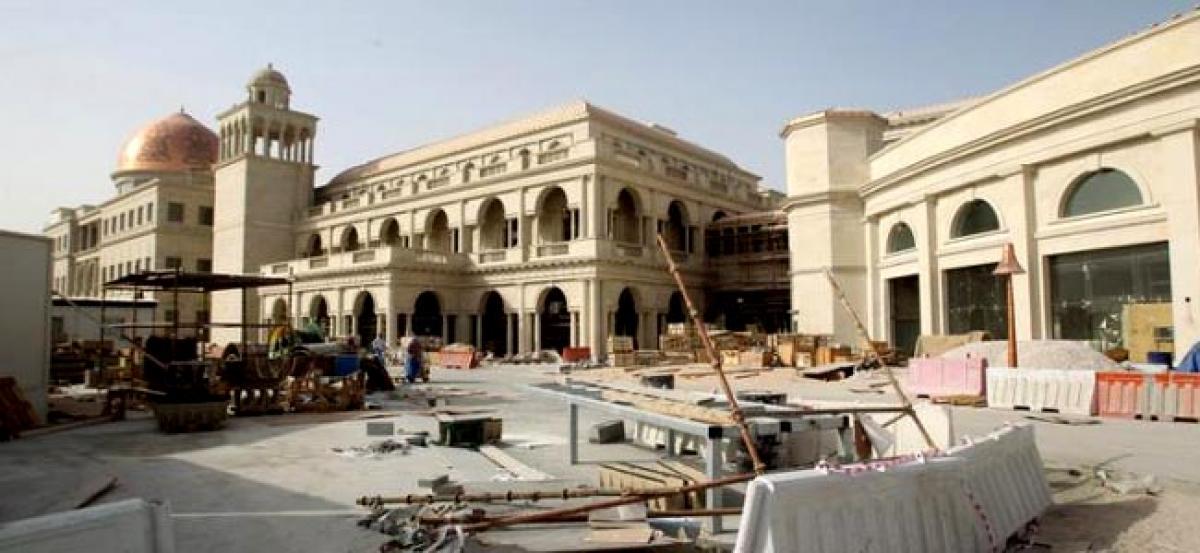Live
- Congress remembers Dalits only in bad times: Mayawati taunts Rahul Gandhi on Parbhani visit
- Have time for jailed leaders but none for achievers: BJP slams Delhi govt over chess champion’s pain
- Alliance University holds 13th Convocation, 1145 students receive degrees
- SC orders strict action against illegal construction
- Man kills sibling over property dispute
- Karnataka gets third govt cardiology hospital
- Minister Ramalinga’s efforts help safeguard over 10,000 acres of temple Land
- Laxminarayan College gets NAAC B+ accreditation
- Champions Trophy: India vs Pakistan Match Likely to Be Held on This Date
- Tigress Zeenat spotted in Purulia
Just In

A 24-year-old jazz fan from Qatar, Hanan al-Kaabi did not lament the closure this summer of the Gulf state\'s only jazz club.
A 24-year-old jazz fan from Qatar, Hanan al-Kaabi did not lament the closure this summer of the Gulf state's only jazz club.
Acclaimed trumpeters and pianists from New York's Jazz at Lincoln Center band had played at the club in the St Regis Hotel in Doha, a few miles from Kaabi's house.
But a law in Qatar forbidding nationals from entering venues serving alcohol meant she could not attend the club billed as the home of jazz in the Middle East.
"I tried to go to an event celebrating the women of jazz," Kaabi said. "It embarrassed me, the thought that I was barred from enjoying this unique art form in Qatar."
Her experience reflects the delicate balance struck by Qatar, a future soccer World Cup host, as it imports Western art and music to raise its global standing, while also paying heed to local tradition and curbing budgets due to low oil prices.
The $20 million jazz club, with burgundy couches and a curved stage modeled on Dizzy’s Club Coca-Cola in Manhattan, was founded in 2011 by a Qatari real estate developer and sought to cater to both expats and Qataris by holding musical workshops for children and concerts outdoors at alcohol-free venues that Qataris could attend. But few did.
In July the St Regis announced it was ending its contract with Jazz at Lincoln Center and opening in its place a new venue offering "more musical genres" to a "wider audience".
TRICKY MARRIAGE
Officials say Qatar, a former backwater that is the world's largest liquefied natural gas exporter, has paired sensible spending with awareness of local tastes as it has evolved into a cultural hub in the Middle East.
"As a nation that's growing very quickly and embracing global culture ... we're trying to bring contemporary artists here to inspire young artists ... with complete respect to our tradition," said Sheikha al-Mayassa al-Thani, the emir of Qatar's sister and one of the art world's most powerful figures, when asked at a conference in Doha in March if she feared a backlash against Qatar's art choices.
"It doesn’t mean that we're trying to create controversial moments. Not everybody can travel around the world, but we can organize exhibitions from the world."
Since the mid 2000s, Qatar's ruling monarchy has invested its immense energy wealth in education and the arts, opening museums, galleries and film festivals and staging international exhibitions by artists including Damien Hirst and Richard Serra in an effort to diversify its economy.
The move to embrace art and culture has incorporated local tradition: Arab presenters host English-language radio stations funded by the government, European publishing houses translate Arabic novels into English; and a philharmonic orchestra founded in 2007 balances its European repertory with the Arabian of its resident composer, a prominent Lebanese oud player.
Yet it remains a tricky marriage.
In a country where modern art and Western music are still relatively unappreciated and whose economy is under strain, some Qataris complain the ventures are costly and not to local tastes.
"People ask: who are these projects for?" said Isa al-Mani, an engineering student at Qatar University.
"A billion riyal opera house ... yes it's a good development for the country but it is outsiders who attend, not Qataris."
Since the oil slump in mid-2014, cultural projects in Qatar have been axed, including a partnership with British publisher Bloomsbury Publishing terminated in December and the closure in October of radio stations funded by the Qatar Foundation, a semi-private educational organization founded by the emir's father but now facing budget cuts.
"DRINKING AND SHAMELESSNESS"
Economic problems may have prompted some of the cost-cutting. But since he took power in 2014, Qatar's emir Sheikh Tamim bin Hamad al-Thani has emerged as a risk-averse figure attuned to traditional forces that run deep in society, analysts and diplomats say.
"He knows that projects which may have put Qatar on the map did not always jibe with the local population," said a Western diplomat in Doha.
In 2013 a statue of French footballer Zinedine Zidane delivering a head-butt to an Italian player was removed from the Doha waterfront after being criticized for promoting violence.
A year later a local newspaper published articles accusing officials from Qatar's museums authority (QM) of abusing their power and of frequent "drinking and shamelessness", a charge QM denies.
Despite cuts to its budget, the museum authority is building two new institutions to complement Qatar's existing museums of Islamic and modern art.
Among the projects going ahead is Qatar's National Museum, designed by architect John Nouvel and shaped like a desert rose, which will open on Doha's shoreline and stage exhibitions on the country's natural history and tribal wars.

© 2024 Hyderabad Media House Limited/The Hans India. All rights reserved. Powered by hocalwire.com







